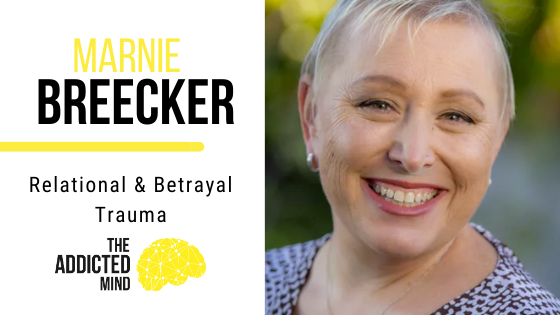The Six Dimensions are:
Shattered Inner World – In this initial dimension, the four core beliefs (the world is benign and a source of pleasure; the world is meaningful, controllable, and just; people are trustworthy and worth relating to; and the self is worthy, lovable, good, and competent) are threatened by the traumatic event(s) of betrayal. This has been compared to the trauma of finding your house burned down and losing all of your belongings.
Life Crisis – The disparity between belief and reality that develops after the discovery of the addiction causes the trauma symptoms discussed in Part One of our discussion with Marnie in Episode 21. This dimension can include wondering who to tell and where to get help, making childcare arrangements, handling other aspects of daily life that have been shaken, and the uncertainty of whether the threat of betrayal continues.
Existential Trauma – In this dimension, the partner loses faith in their own ability to make decisions, questions the core beliefs around which they have created meaning, begins to approach this “new world” with distrust and fear, and experiences damage to the relationship with self. This can be the dimension that takes the longest to heal during the process.
Emotional Trauma – This involves the patterns of emotional abuse (lying, deceiving, manipulating) used by the addict to keep their secret. Emotional trauma can be overt (rage, yelling, etc.) or covert (sophisticated attack patterns in which the anger is less obvious because the addict casts blame or makes the partner feel crazy, which can be known as “gaslighting”).
Sexual Trauma – Neglecting to address the partner’s sexual trauma makes later restoration and healing more challenging, so it is crucial for their feelings to be validated and their responses to be normalized.
Relational Trauma – In this dimension of trauma, the addict must build the skill of empathy and understand that relational healing will take a lot of time and patience. There are no shortcuts to relational healing after the drastic rupture of betrayal that has occurred.
The steps for partner healing are contingent on their basic background: Do they have children? Are they married to the addict who betrayed them? Do they have a history of abuse? Do they have a mental illness that will need to be factored into their healing process?
The first step for partner healing is to reach out for help. This could be difficult because of the fear of what others will think, but the shock and crisis that the partner is experiencing necessitate external help. A primary purpose of this initial counseling is to provide education to the partner about sex addiction and give words to their experiences so they know that they are not the first person to go through this.
The second step is for the partner to seek out resources such as strategies for coping, meeting with a doctor if they are in need of medication, and joining a support group. As long as the addict is also in the recovery process, it is a good idea for their therapist to collaborate with the partner’s therapist in order to provide both partners with the proper context in their communications.
The third step is for the partner to come up with a list of what they need in order to feel safe in the relationship if the individuals have decided to restore their relationship. This list of boundaries and needs as well as consequences for boundary-crossing is helpful for both partners to adhere to during the healing process.
The fourth step is for the partner to identify the losses they have suffered because of the betrayal so that they can adequately grieve or mourn and be able to move on.
Finally, the partner’s counseling and healing process should involve different modalities which will heal the nervous system.
For more information about the “Helping Couples Heal” 2-day workshop focusing on the Six Dimensions discussed in this podcast as well as providing tools to heal the relationship hosted by the Center for Relational Healing, visit http://lacrh.com/workshops-and-groups/.

Helping Couples Heal Podcast
Due to the strong response to these episodes, Marnie Breecker and I decided to start a podcast that directly speaks to betrayal and relational trauma. Click the button below to learn more or search for “helping couples heal” in your podcast app.

